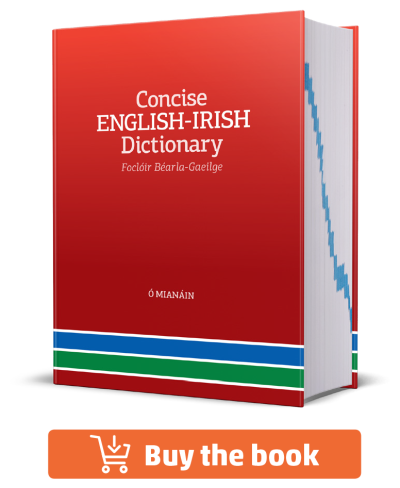Foclóir Gaeilge–Béarla
Ó Dónaill, 1977
An Foclóir Beag
Ó Dónaill & Ua Maoileoin, 1991
English–Irish Dictionary
de Bhaldraithe, 1959
Grammar
Pronunciation
tobadán
tobainne
tobairín
tobán
tobann
tobar
tobathrú
tobh
tobhach
tobscor
tóc
tócad
tócaifearól
toch
tóch
tochail
tochailt
tochairt
tochais
tóchálaí
tochalta
tochaltach
REVERSE SEARCH
IN FOCLÓIR GAEILGE—BÉARLA
PHRASES
IN FOCLÓIR GAEILGE—BÉARLA
Ba mhaith liom iad a bheith ann, I would like them to be there.
Is ann ba mhaith léi a hadhlacadh, it was there she wished to be buried.
Cibé duine a mbeidh an t-ádh air, whoever is going to be lucky.
Sin le rá, that is to say; in other words.
Dúirt mé liom féin gurbh fhearr dom fanacht sa bhaile, I said in my own mind, I considered, that it would be better for me to stay at home.
Ní tú atá mé a rá, I am not referring to you.
Níl dada le rá leis ach an méid sin, there is nothing to be said to him, concerning him, but that.
Ná bíodh sé le rá leat gur loic tú, let it not be cast up to you that you defaulted.
3. Níor tháinig sé ~ leis é a dhéanamh, it is not in his nature to do it.
Thug sé ~ leis é, it is natural to him, he inherited it.
Baineann sé le h~, it is relevant to the subject.
8. Tá sé ar a ~ féin, he is on his own, free to follow his own inclinations.
Is mór an spórt é i mbaile gan ~, it is great sport for those who have nothing better to do.
Is doiligh ~ a bhaint as a chuid cainte, it is hard to make sense out of what he says.
Ní dhearna sé ~ a cheann a chromadh, all he did was to bow his head.
Bhí sé sásta ~ an leithscéal sin a ghabháil leis, he was satisfied when that excuse was offered to him.
Cén t-~ é go Corcaigh? How far is it to Cork?
Bhí sí ag caoineadh an t-~ a bhí sí ag caint liom, she was weeping while she was talking to me.
Níl sé d’~ aige na fiacha a íoc, he is unable to pay his debts.
~ a bhaint as caint, a dhéanamh de chaint, to make sense out of what is said; to draw a conclusion from what is said.
Léitear ag Eoin, it is to be read in (the gospel of) St. John.
Ag seo mo chomhairle duit, here, this, is my advice to you.
Is minice an moladh aige ná an cáineadh, he is more given to praise than to blame.
Níl agat ach é a bhrú, all you have to do is to press it.
Ba mhaith againn é, it would be well for us to have it.
Bhí sé mór againn imeacht air, it was too much to expect that we should leave without him.
Tá sé in am aige pósadh, it is time for him to get married.
An rud a bhí sé ag iarraidh a dhéanamh, what he was trying to do.
Tá ~ na farraige, na gaoithe, isteach ann, it is exposed to the sea, the wind.
Fainic ~ ná tit, be careful not to fall.
Bí cinnte ~ tabhair leat é, be sure to take it with you.
D’imigh sé go Meiriceá. A~ nuair a bhí sé tamall thall . . . . He went to America. And when he was there some time . . . .
Bhí sé ag iarraidh é a cheannach ~ gan mórán airgid aige, he was trying to buy it although he had little money.
Má tá i ndán ~ go saorfar é, if he happens to be set free.
Duine ~, one who is inclined to exaggerate.
Tá sé dóite ina ~, it is burnt to a cinder.
Tá na gearrcaigh ~, the young birds are fully fledged, ready to fly.
~ an chronaithe, a wasting disease (supposed to be caused by witchcraft).
Is deacair ~ a bhaint as, it is hard to make him talk.
Is é ab ~ liom a rá, what I want to say is.
Tá tú ar bhealach d’~a, you are on the road to ruin.
Bheith in umar, i gcorrach, i bportach, na haimléise, to be in a miserable plight.
Tá an obair seo ~ agam, I am unused to this work.
Tá ~ orm leis an obair seo, I am unused to this work.
Beidh ~ air a bheith leis féin, he will find it strange to be alone.
Tá sé ~ ann féin, he is stuck-up, he speaks to nobody.
In ~ a bheith ag obair, supposed to be working.
Níl ~ aige ar a chuid oibre, he is not attentive to his work.
Fágadh a h~ uirthi féin, she was left to care for herself; left without support.
Agus an dá lá (a chur) san ~, both days (to be) included.
